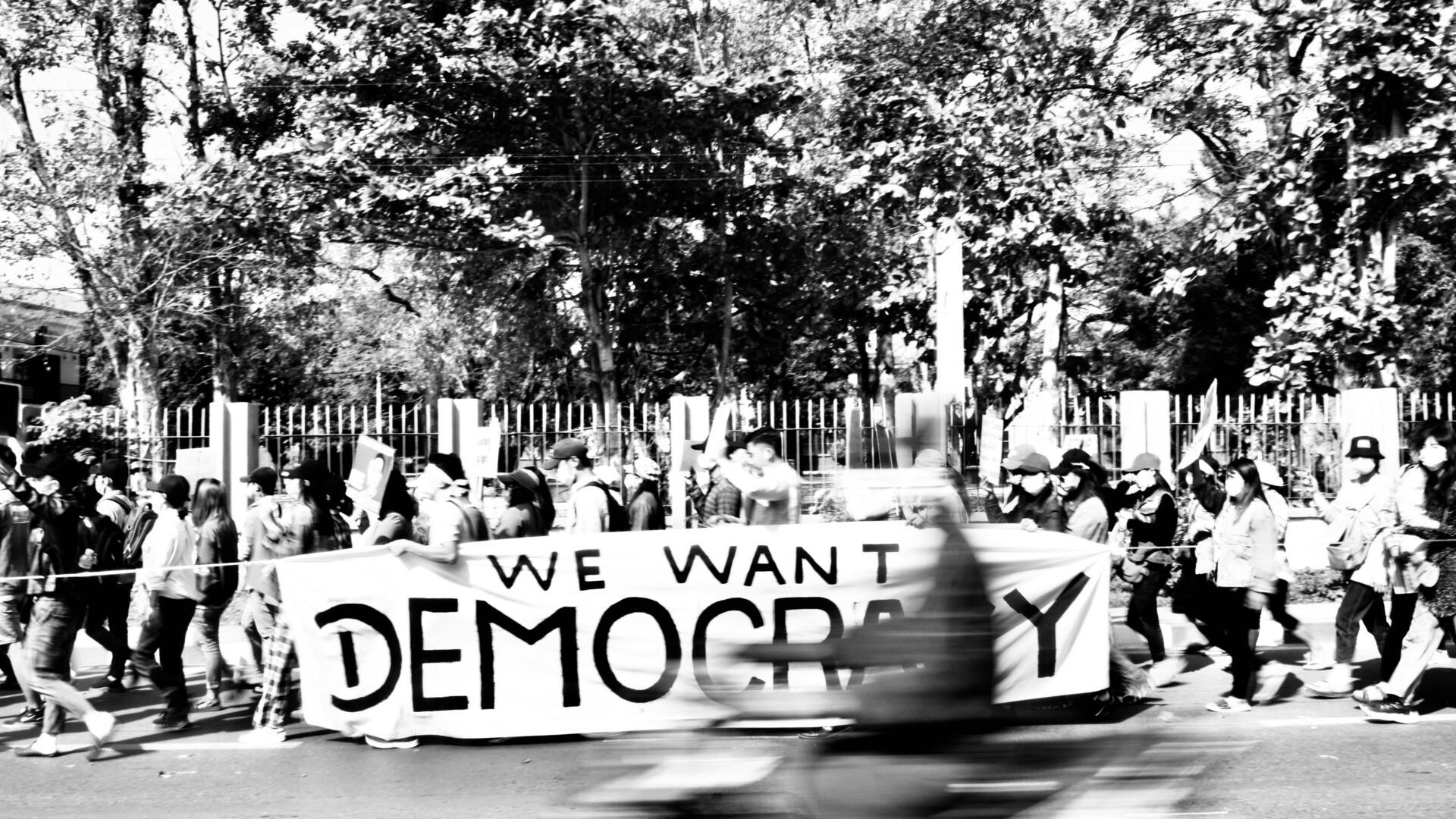Over the past two decades, the world has faced a global democratic decline. Four reports measuring the state of democracy globally speak volumes about the path to authoritarianism in 2024:
- Only 6.6% of the world’s population live in states defined as full democracies (The Economist Intelligence Unit EIU).
- Almost 3/4 of the world’s population – 72% – live in autocracies (V-Dem Institute).
- Globally, voter turnout has fallen by almost 10% in the last 15 years (International IDEA)
- For the first time in more than 20 years, the world has fewer democracies than autocracies (V-Dem Institute)
- Political and civil rights deteriorated in 60 countries and improved in only 34 (Freedom House)
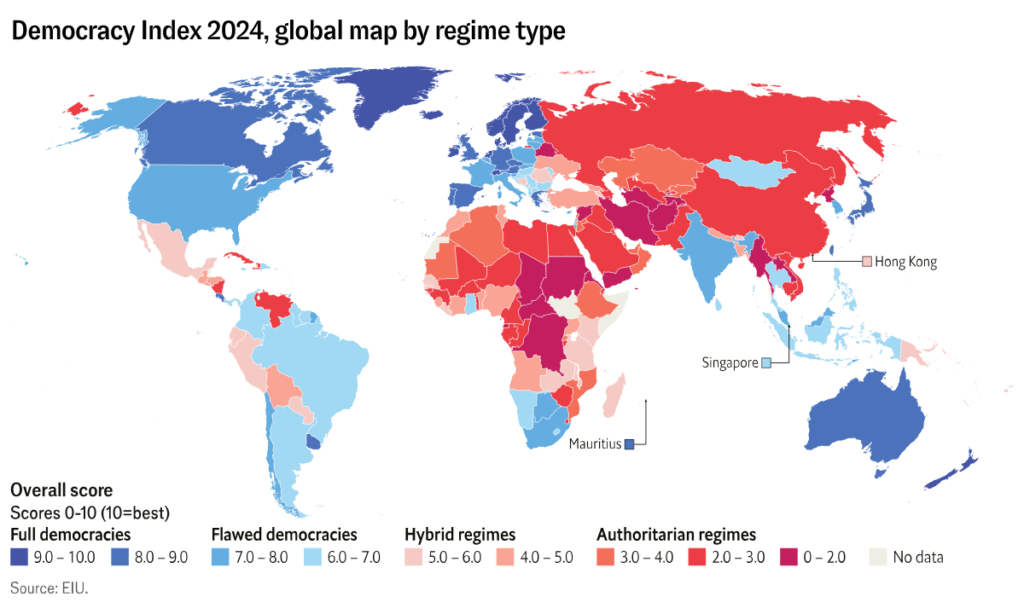
The indicators that measure democracy in these reports are not identical. In addition, the classification of countries and regions into different categories based on the state of democracy differs between the reports: the V-Dem Institute and the EIU divide countries into four categories, while the International IDEA and Freedom House have only three categories. As a result, for example, the number of countries defined as democracies differs between reports. However, all the reports share the same key message – the trend towards authoritarianism is alarming.
Autocratisation is both broader and deeper than before
The V-Dem Democracy Report 2025 states that the number of autocracies (N=91) has exceeded the number of democracies (N=88) for the first time in more than 20 years. Almost 40% of the world’s population live in authoritarian states, such as Georgia, Indonesia and Sudan. Meanwhile, only around 6% of the world’s population live in democratising states, most of them in Brazil, Poland and Thailand. The last time the number of liberal democracies was as low as it is today, was at the end of the Cold War in 1990.
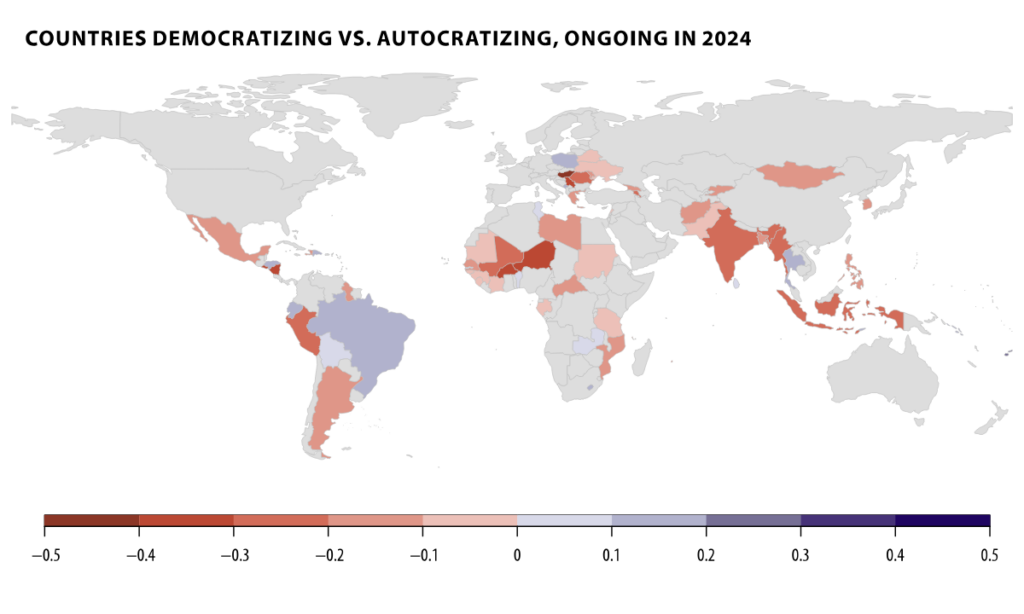
Autocratisation was not only stronger than democratisation around the world – it also deepened in many countries already classified as autocracies. According to V-Dem, Belarus, Gabon, Lebanon and Niger regressed from electoral autocracies to closed autocracies in 2024. Electoral autocracies are countries where multi-party elections are held, but electoral freedom and independence are not guaranteed, and human rights such as freedom of expression and association are not sufficiently respected. In closed autocracies hold no multi-party elections and are characterized by the absence of fundamental democratic components such as freedom of expression, freedom of association, and free and fair elections.
Many democracies, such as South Korea, Argentina and Romania, also experienced the effects of authoritarianism according to the democracy reports. However, the results are not entirely straightforward: Although South Korea’s democratic development experienced backsliding due to the unjustified declaration of a state of emergency by President Yoon Suk-yeol, just six hours later, the parliament revoked the declaration, and the country soon saw the start of major strikes demanding the resignation of the president. The people refused to give up ondemocracy.
The countries where Demo Finland supports democratisation cover all of V-Dem’s governance categories. Finland is the only country that meets the benchmark of a liberal democracy, where, in addition to free multi-party elections, human and political rights are equally respected and protected by law. Kenya and Zambia are classified as electoral democracies with free and fair multi-party elections and a reasonable level of respect for human and political rights. Ethiopia, Mozambique and Tunisia are classified by V-Dem as electoral autocracies. Myanmar is classified as a closed autocracy; the country is ruled by a military junta that seized power in 2021, and the civil war is continuing for the fifth year. In addition to these countries with long running democracy support programmes, Demo Finland is launching a democracy support project in Kosovo, which is classified as an electoral democracy.
Freedoms are declining around the world
According to the International IDEA, in recent years, factors that contribute to democracy, such as credible elections, economic equality and press freedom, have weakened more than strengthened in 79 of the 173 countries surveyed. At the same time, only 42 countries have seen these factors strengthening. In 2023, the indicators that deteriorated the most were under the categories of representativeness and rights, such as the functioning of parliament and freedom of expression. However, this is not a new phenomenon: a declining number of countries have experienced an improvement in democratic performance over the last 30 years.
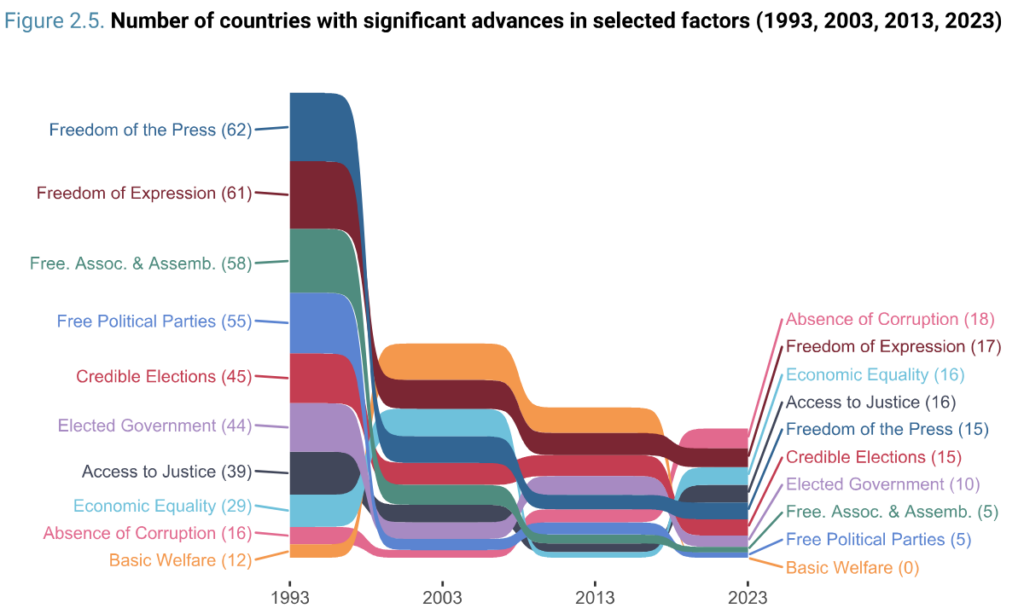
2024 has been called the super year of elections, as the number of elections held globally reached record numbers, and almost half of the world’s population had the opportunity to vote. Although elections enabled the realisation of democracy in many countries, there were many instances where the freedoms and rights of citizens were not met. According to Freedom House, in 2024, political rights and civil liberties suffered the greatest decline in Kuwait and Tunisia, both of which saw the democratic process undermined by their ruling leaders. According to the EIU report, Kuwait’s Emir Meshal Al Ahmad Al Jaber cancelled general elections due in May and dissolved the country’s National Assembly for up to four years. The presidential elections in Tunisia in October were marred by the electoral commission loyal to the administration of incumbent President Kaïs Saïed, denying candidacy from most of his opponents.
According to V-Dem, the decline in freedom of expression was visible in 44 countries in 2024. With the expansion of social media, political debate has increasingly moved to online platforms. Therefore, restrictions on freedom of expression are increasingly being seen in this arena. For example, in Mozambique, after the parliamentary elections in September, the authorities shut down internet access on all mobile services to prevent the spread of information protesting against the regime, says the EIU report.
If citizens are allowed only one way of thinking as truth and fact, they are deprived of the right of choice that is an integral part of democracy.
Freedom of expression was also seen deteriorating last year in countries otherwise considered on a stronger path to democratisation, such as Brazil. V-Dem sees democracy strengthening in the country from 2022 onwards: for example, through increased freedom of academic research and respect for the constitution. At the same time, the EIU Democracy Index highlights a case where freedom of expression was significantly undermined by the Brazilian Supreme Court’s decision. The Supreme Court imposed a total ban on X (formerly Twitter) to force its owner, Elon Musk, to respond to hate speech and disinformation spread on X. The Supreme Court’s good intentions had some worrying consequences: the total ban limited millions of Brazilians’ access to political debate on a platform they were familiar with for several weeks just before the country’s municipal elections.
Restrictions on freedom of expression go to the heart of democracy: the ability to criticise those in power and the freedom to express different views are critical elements of democracy. If citizens are allowed only one way of thinking as truth and fact, they are deprived of the right of choice that is an integral part of democracy.
A U-turn towards democracy is possible
Despite the alarming state of authoritarianism, there are countries where democracy has been strengthened and authoritarianism reversed, says a report by the International IDEA. In 2015, the national conservative Law and Justice Party (PiS) came to power in Poland, and under its leadership, citizens’ rights were eroded in areas such as media freedom and freedom of expression. However, in the 2023 parliamentary elections, PiS lost its majority in parliament, and since the beginning of last year, Poland has been led by a more pro-EU, liberal government that has sought to restore media freedom.
In addition to Poland, positive developments in democratisation are also expected elsewhere. Freedom House has found democratic openings in Senegal, Sri Lanka and Bangladesh: In Senegal and Sri Lanka, new country leaders were successfully elected, despite attempts by the incumbent rulers to rig the elections. In Bangladesh, a student-driven protest movement critical of the regime eventually led to the resignation and exile of the autocratic Prime Minister Sheikh Hasina. The country is now led by an interim government backed by the protest movement, and confidence in democratisation is stronger than it has been for years. However, the democratisation of the country needs support to break the trend of authoritarianism.
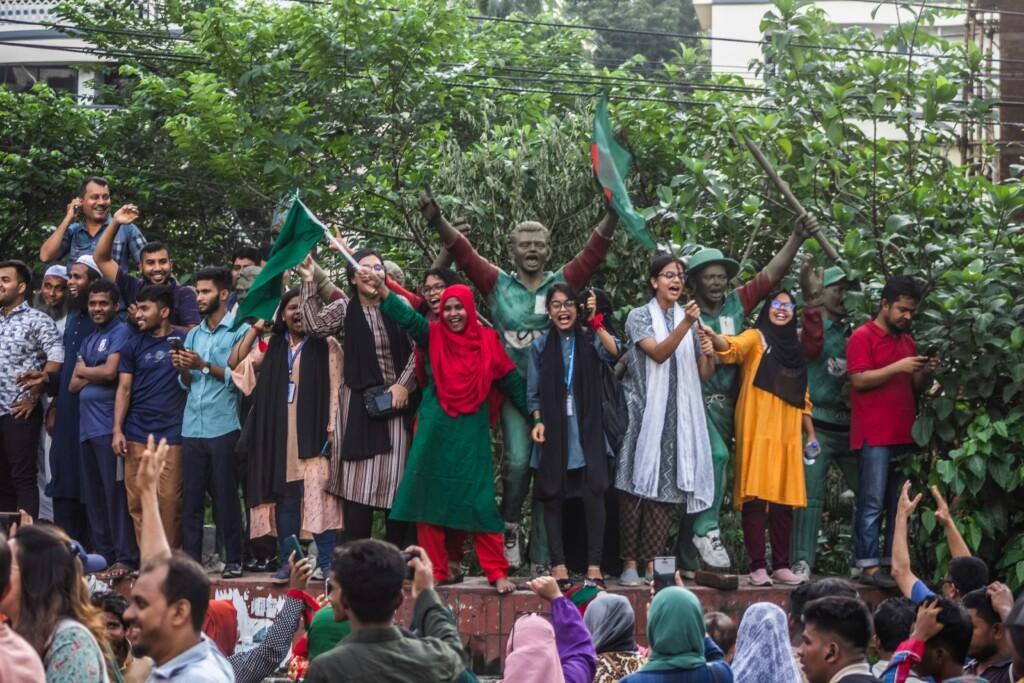
Support for democracy at stake?
The reports in question cover the year 2024 and were published in the autumn of 2024 and early 2025. Thus, the statistics show the state of democracy in the United States largely at its previous level. However, V-Dem’s Democracy Report 2025 highlights the worrying developments of the second term of the re-elected Donald Trump administration.
During his first months in office, President Trump has dismantled the foundations of democracy at an alarming rate. He has pardoned more than 1,500 convicted criminals for taking over Capitol Hill, fired top administration officials from key government agencies such as the Departments of Defense, Justice and Interior and replaced them with loyalists. In addition to this, the President has restricted freedom of expression and academic inquiry, for example by banning vocabulary related to diversity, equality and inclusion.

The Department of Government Efficiency (DOGE), a department created by President Trump, has added its own troubling dimension to erosion of democracy in the US. Despite its name, DOGE is not part of the official administration. It is, however, as the name states, tasked with making the government more efficient. In its task, it has already fired tens of thousands of administration employees and cut funding to many agencies. The cuts have also affected the US Agency for International Development (USAID), which Trump has sought to shut down disregarding both the US Constitution and opposition from Congress.
The dismantling of USAID will have serious consequences not only for the United States but also for democracy support worldwide. The United States has been the world’s largest financer of democracy support. Several other countries, such as the United Kingdom and the Netherlands, have also decided to cut funding for development cooperation and, consequently, for democracy support.
During his first months in office, President Trump has dismantled the foundations of democracy at an alarming rate.
Democracy is therefore facing difficulties all over the world, and even the state of the most stable democracies cannot be taken for granted. The erosion of rights, the deepening and widening of authoritarianism and the cuts in democracy support funding speak a harsh truth about the state of global democracy. But we should not be discouraged by increasing authoritarianism – or as the EIU report says: “The solution to the challenges of representative democracy is not to throw the baby out with the bathwater”.
However, democracy cannot just be imported – the need and motivation for its development must come from the state and its citizens themselves. That is why potential, emerging and established democracies must all be supported in their democratisation processes. Although democracy looks somewhat different in different countries, the sharing of knowledge, resources and good practice is of the utmost importance. Democracy is never complete but rather must be constantly developed and strengthened.
—
The views expressed are those of the author and do not necessarily reflect the views of Demo Finland.

